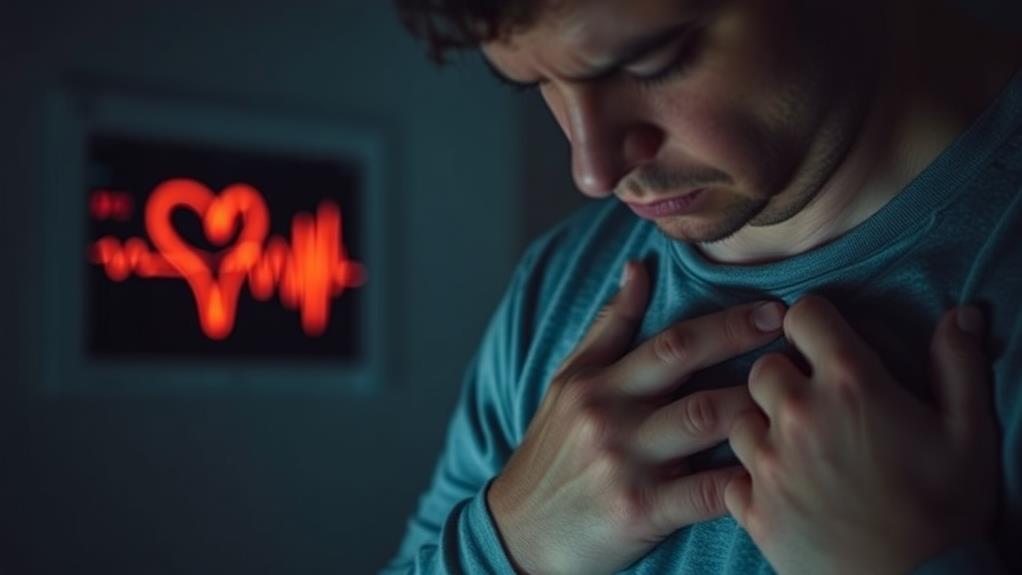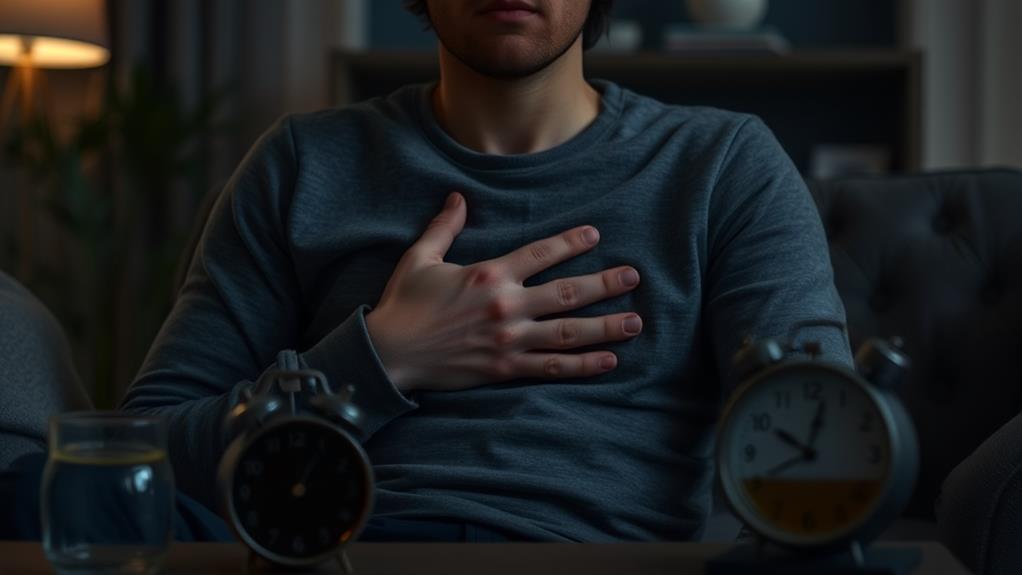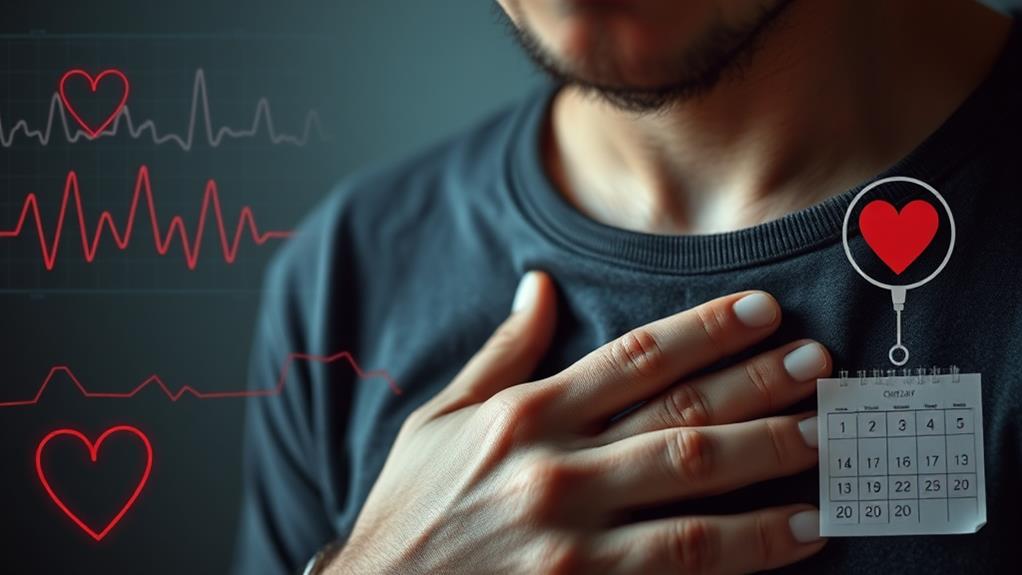You might not realize it, but your body can signal trouble well before a heart attack occurs. If you've been experiencing persistent chest pain, unusual fatigue, or shortness of breath, it is crucial to pay attention. These symptoms, along with heart palpitations and discomfort in other areas, could be your body's way of alerting you to potential issues. Understanding these early signs can make a significant difference, but there's more to uncover about how they manifest and what steps you should take next.
Chest Pain

Many people experience chest pain as an early warning sign of a heart attack. In fact, about 68% of individuals report this symptom before a heart attack hits. That's a big deal! You might feel pressure, tightness, or even a squeezing sensation right in the center or on the left side of your chest. It's not just a random ache; it's something to pay attention to.
These chest pains can last for a few minutes or show up as intermittent discomfort. You might think it's just indigestion, but it's essential to recognize these warning signs and act quickly. Remember, the earlier you get medical attention, the better your chances are for a positive outcome.
Whether you're a guy or a gal, those chest pains are real. Studies show that 93.9% of men and 94.4% of women experience this prodromal symptom before a heart attack.
Shortness of Breath
Shortness of breath can be a critical warning sign of an impending heart attack. It's not just something that happens after running or climbing stairs; you might feel it even when you're resting. This symptom can mean your body isn't getting the oxygen supply it needs, which is a big deal!
Did you know that about 42.1% of women reported shortness of breath as a warning sign before a heart attack? That's why it's super important to pay attention to this preemptive symptom recognition.
Sometimes, shortness of breath goes hand-in-hand with chest discomfort, but it can also show up all on its own. If you notice it hanging around for a while, don't just brush it off. Monitoring breathing difficulties is key!
If you're feeling suddenly short of breath or if it's getting worse, it's time to consult a healthcare provider. They can help you figure out if it's a sign of cardiovascular disease or something else.
Unusual Fatigue

Unusual fatigue can hit you like a freight train, leaving you feeling drained and unable to shake off the tiredness, even after a good night's sleep.
It's not just a matter of needing an extra cup of coffee; it can be a warning sign of a potential heart attack. Did you know that about 70.7% of women report this kind of fatigue weeks before experiencing a heart attack?
When your energy levels drop drastically, it could mean decreased blood flow to your heart. You might also notice other symptoms, like shortness of breath or chest discomfort.
If you feel unusually tired and it doesn't get better with rest, pay attention!
This fatigue isn't something to brush off. It's essential to monitor these changes in your body, especially if they're accompanied by other warning signs.
Early detection can make a world of difference. If you're feeling this way, consider seeking a medical evaluation. It might just be your body's way of saying, "Hey, let's take a closer look!"
Heart Palpitations
Heart palpitations can feel alarming, like your heart's racing or skipping a beat. You might notice these heart palpitations when you're resting, or even while you're active. It's important to pay attention to these early symptoms, as they can signal potential cardiovascular issues. If you experience persistent palpitations, it's a good idea to seek medical attention.
Sometimes, palpitations come with other signs like chest discomfort or shortness of breath. These can be heart attack warnings, so don't brush them off! Monitoring changes in your heart rhythm is essential. If your heart starts playing tricks on you more often than usual, it's time for a check-up.
Recognizing palpitations early can lead to timely medical intervention, which is key to keeping your heart healthy. You're the best judge of your body, so trust your instincts. If something feels off, speak up!
Chest Heaviness

A feeling of chest heaviness can be a significant warning sign that shouldn't be overlooked. If you ever feel tightness or pressure in your chest, it might be your body trying to tell you something important.
This sensation, experienced by around 44% of people before a heart attack, can happen during physical activity or even when you're just relaxing. Don't brush it off as something minor!
Chest heaviness can last for several minutes or come and go, but if it happens frequently, it's time to seek medical attention.
You should definitely pay attention to any other warning signs, like shortness of breath or radiating pain. Ignoring these symptoms can be risky, especially since early recognition can lead to timely intervention and possibly prevent heart disease from getting worse.
Pain in Other Areas
Discomfort in areas beyond the chest can signal an impending heart attack, yet it often goes unrecognized. You might feel pain in your arms, back, jaw, or stomach weeks or even months before a heart attack happens.
It's easy to mistake this discomfort for something less serious, like a muscle strain or indigestion. However, these can be warning signs related to reduced blood flow to your heart.
Interestingly, a 2023 study found that 68% of people reported chest pain as a common symptom, which can also spread to these other areas. Women, in particular, often experience atypical pain, like in their back or jaw, which can lead to higher risks after a heart attack.
So, if you notice any unusual pain, don't brush it off. It's essential to listen to your body!
If you're experiencing these symptoms, seek medical attention right away. They could be your heart's way of signaling that something's off.




